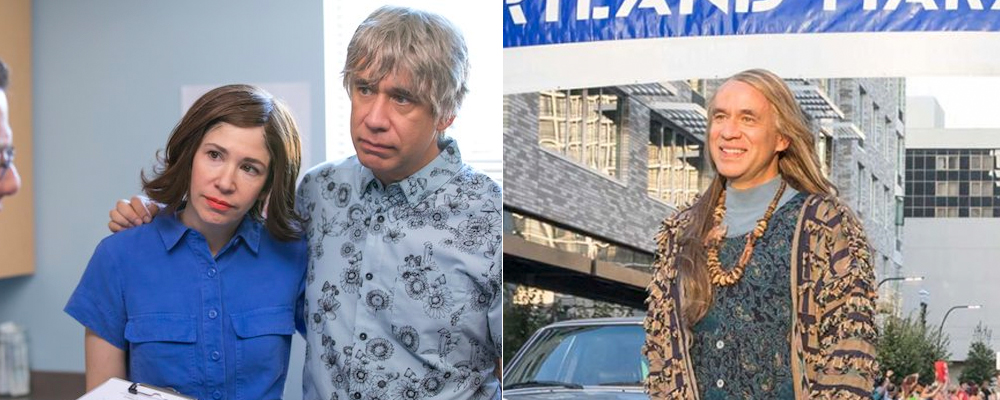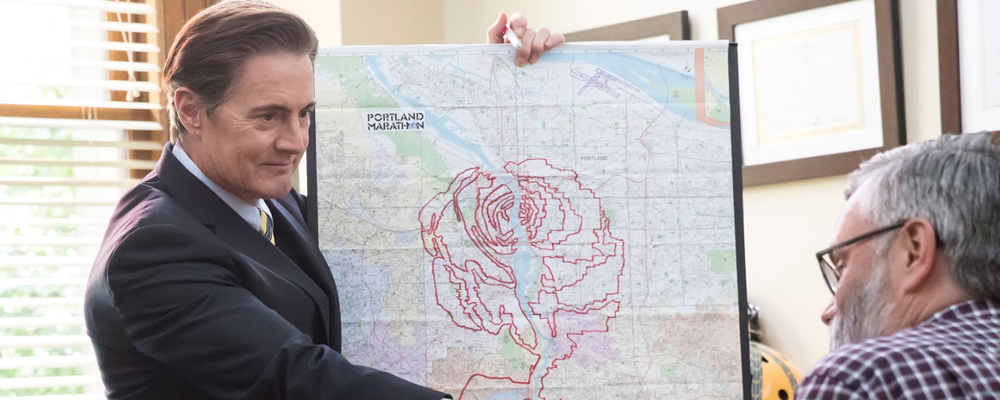‘Portlandia’ Says Goodbye With Its Playful Take on Suburbia Intact
Alci Rengifo
After eight seasons of skits and quirks poking fun at the oddities of American suburbia, “Portlandia” has said goodbye. IFC’s crowning comedic program, it joined the slew of shows which explore the ways of the American middle class and its rural cousins. But it was never particularly mean or savage. Instead it was more farcical but sharp, calculating but also spontaneous. The final season felt like one last lap for the show to explore its favorite themes and characters. It is no surprise that the main storyline of the series finale itself is a big marathon around Portland. The show came, it saw, it chuckled.
The finale is driven by the show’s skit attitude, but the center is a marathon being obsessively planned by Portland’s mayor, played by Kyle MacLachlan in a neo-Twin Peaks mode. He becomes obsessed with an idea called the “Rouse Route,” in which the marathon route will be shaped like a giant rose around the city. Getting access to certain areas will be tough because local businesses and residents are angry over that pesky feature of gentrification: The rise of expensive condos. While the mayor tries to get his dream turned into reality, regular character Candace (Fred Armisen) is hosting a runner played by Dolly Wells, who preaches positivity and the banishment of all meanness, which baffles Candace. Also training to run is our favorite couple played by Armisen and Carrie Brownstein, who want to exercise to relieve the stress of reading too much news.
First premiering in 2011, “Portlandia” was one of the defining shows in a style often termed “hipster humor.” By using Portland’s ins and outs as a microcosm, it cheerfully spoofed first world problems. Season 8 at its best has felt like one final hoorah in this vein. More than often some episodes have truly taken on the attitude of sharp satire. In one episode two local goths, known as “The Weirdos,” lose their trash bin and go looking for it. Cut to a pristine, picture-perfect family putting their daughter to sleep with words of comfort. When the girl looks out her window and sees the goths her viewpoint transforms into a vision of demons and a voice uttering “666.” In one particularly biting skit Armisen and Brownstein attend career day at a local school and talk about working in “the gig economy” for “20 to 22 hours a day.” Technically this is called being self-employed, but in reality you’re beholden to whatever app you happen to be working for. One of the best skits was early on in the season premiere, where a group of middle-aged Punk rockers, featuring Henry Rollins on vocals, try to revive “rebellion” in Portland only to realize they themselves are comfortable as conformists.
To close its run the show sticks to this line of humor effortlessly. Some of the best scenes involve Candace and Dolly. Dolly insists on being positive at all times, while Candace can only stare and say “you don’t have anything mean to say about anyone do you?” Of course when Candace asks if she can comb Dolly’s hair while she sleeps, Dolly doesn’t seem too happy about the idea. Some of the humor is farcical but memorable, like an ad someone holds up for a condo being built in Portland called “The Coop,” with a giant rooster painted on the building. The show also knows how to utilize modern hipster lingo. Armisen and Brownstein go to a trainer named Bailey played by Tessa Thompson. Bailey goes on and on about the need to achieve a “running high,” when all of your worries and fears simply melt away “like gold” after you push yourself hard enough. In a previous episode the opening skit was a musical number about how all is doomed amid an apocalypse where everyone is obsessed with social media. There are small jabs of cynicism like this, especially in one scene where Candace casually responds to Dolly’s positivity by saying she would like to press wrapping paper on the face of humanity.
Yet “Portlandia” has always been satire that feels comfortable, like a fun joke as opposed to a vicious critique. It ends its eighth and final season amid a culture quickly changing from the world of the first season. Now the uncertainty and restlessness of the times seems out of step with the show’s lighthearted jabs. But the final season has offered everything fans adored about this show and even a little more. “Portlandia” leaves us just as it arrived, with the energy you find in a great improve troupe. It made fun of America in a way absolutely appropriate for its time and place, and it leaves us with a wink and a smile.
The series finale of “Portlandia” aired March 22 at 10:30 p.m. ET on IFC.


